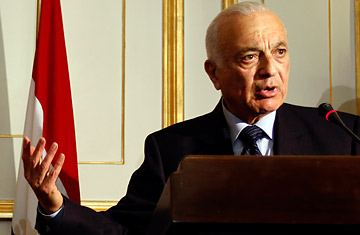
Egypt's Foreign Minister Nabil Elaraby speaks during a news conference with U.S. Secretary of State Hillary Clinton in Cairo March 15, 2011.
(2 of 2)
But it may not be a such bad sign either — at least as far as the U.S., Europe, and other countries in the Middle East are concerned. Other Arab states that have normalized relations with Iran, like Qatar and Oman, have proven useful intermediaries at times between the rogue republic and its western adversaries. In tandem with Brazil, Turkey, the largest non-Arab Muslim nation in the area, independently negotiated a nuclear agreement with Iran when Western efforts at coercion failed. (The agreement did not stick because Western officials declared that it did not meet conditions set by the U.N.) But, while Turkey's success may have proven embarrassing to U.S. leadership because Washington wasn't responsible for the deal, Sick says, "the opportunity to actually have a valuable interlocutor between the United States and Iran, I know from personal experience, was immensely useful."
Whether Egypt aims to become an interlocutor is unclear, and perhaps even unlikely at this point. It is more likely that Egypt's leaders want to set an agenda that's independent from the U.S. and Europe. And just because Egypt is trying to regain some of the regional prominence that it enjoyed in the 1950s and 60s when it was a vocal leader of pan-Arab nationalism, doesn't mean it's going to be Iran's new best friend either. "The new Middle East may end up being defined as it was in the past by that triangle of ancient states — Egypt, Turkey and Iran," says Sick. "And I don't think that they will necessarily become allies of each other. Rather they're more likely to be rivals on many different issues."
One of those issues is a lingering suspicion of Iran's Shi'ite theocracy and Tehran's ambitions to "export" its Islamic revolution. Most of the region is dominated by Sunni Muslims; and religious conservatives sometimes view the Shi'a brand of Islam practiced by Iran's majority as heretical. The rise of a Shi'ite government in Iraq has put other Arab states on edge, and an Egypt friendly to Iran is likely to come under a lot of pressure from some of its Arab allies, particularly Saudi Arabia. Regional analysts also say that Arabs have a tendency to exaggerate fears of Iranian influence. "The really active days of exporting the revolution ended in about 1982," says Sick. But psychologically, it may still represent a sizable obstacle to normalization of Egyptian-Iranian relations.
At the same time, it's worth considering who's really in power in post-Mubarak Egypt. Egypt's revolutionaries may indeed start flexing their foreign policy muscles against Mubarak's legacy, but the generals who are temporarily in control of the country may have little interest in bending back the old policies. Mubarak's number two man, the intensely anti-Iran intelligence chief Omar Suleiman has been removed from power. But in his place is Mourad Mwafi, the former head of Egyptian military intelligence, and the governor of North Sinai who held a hard-line on Gaza and Iran-backed Hamas. "I don't know what his politics are, but I think he has a very healthy and realistic sense of the threats that Egypt still faces," says one Western diplomat in Cairo. "I think he is highly skeptical of Iranian intentions — not only the nuclear stuff, but Hamas and Hezbollah and other malign influences in the region. So I think they haven't lost their antennae on these issues."
Indeed, Iran may be eager for a new ally in an international community where it remains highly unpopular. Ambassadors may even be exchanged. But Egypt is likely to proceed with caution. At the end of the day, the Western official adds, Egypt's stance on Iran may not be so threatening after all: "There is no intention at this point, I'm told, to immediately move toward changing the nature of the relationship. It's not there yet. I think the security services still have some concerns."
